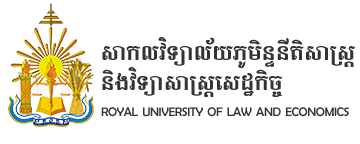Pr. Anaïd Panossian, LLB (Université Jean Moulin Lyon III), LLM (Université Nice Sophia Antipolis-University North Carolina), PhD (Université Nice Sophia Antipolis, Laboratoire Groupement d’Études et de Recherches sur le Droit International et Comparé, GEREDIC) is a professor of public international law specialising in international maritime law and fisheries, with a track record of publications and consultancies in this field of expertise. At RULE, Pr. Panossian intervenes within the international master programs in international law, conducting the core course on Public International Law.
Aside from her academic involvement with RULE, Pr. Panossian is also a professor at the Université de Nantes in France, where she conducts the course Master 2 courses on the international law of fisheries and the law and security of maritime and oceanic activities. She is also associated with the European Commission within the General Department of international partnerships, as well as the Inter-American Development Bank as legal expert.
« Rendre l’invisible, visible : le secteur artisanal et les femmes au cœur des enjeux de pêche et de sécurité alimentaire », Les enjeux alimentaires du XXIème siècle, L’observateur des Nations-Unies, 2015-2, Volume 39, Aix-en-Provence, 2016, p. 31-66
« Pêche et sécurité alimentaire : réflexions sur une approche basée sur le droit à l’alimentation », Annuaire du droit de la mer 2013, Tome XVIII, Institut de droit économique de la mer (INDEMER), Monaco, Pedone, 2014, p. 123-174
« Vers une approche intégrée de la politique maritime de l’UE », présentation aux côtés de Mme la Ministre de l’environnement au Maroc, Forum de la Mer, El Jadida, Maroc, 8 mai 2014
« L’UE et la négociation des accords de pêche avec les États tiers », colloque international, Droit international de la mer et droit de l’Union européenne : cohabitation, confrontation, coopération ? INDEMER, Monaco, Pedone, juin 2014, p. 47-83.
Course : Public International Law
Course Modalities:
–Hourly Volume: 30 hours;
–Scheduled: March;
–Programs: International Executive Master in International Business Law (ULB), Year 1; International Master in Public International Law (Paris 8), Year 2.
Course Overview: This course introduces the fundamentals of public international law through the scope of international normativity as well as the subjects of international law (see detailed outline).
Course Structure:
Introduction
Section 1. History of International Law
Section 2. Specificities of the International Legal Order: ‘’odds and ends or system’’?
Part I – The Fragmentation of International Normativity: The Sources of Public International Law
Chapter 1 – Unwritten International Law – Customary Law and General Principles
Section 1. Customary International Law
- The Process of Formation of Customary Law: Two Elements Theory
- Codification as Evidence of Customary Law
Section 2. The General Principles of International Law
- General Legal Principles
- General Legal Principles of International Law
Chapter 2 – Written Sources of International Law – Treaties
Section 1. The Conclusion of Treaties
- Definition and Classification of Treaties
- Adoption Procedures of Treaties
- Various Degrees of Engagement: reservations
Section 2. Treaties’ Application
- Effects of Treaties
- Conditions of Validity of Treaties: Irregularities and Nullities
- Interpretation of International Treaties
Section 3. Amendment and Termination of Treaties
- Amendment of Treaties
- Termination and Suspension of Treaties
Chapter 3 – Other Sources of International Law
Section 1. Unilateral Acts
- Unilateral Acts of States
- Unilateral Acts of International Organizations
Section 2. Auxiliary Means of Determination of International Law
- Doctrine
- Jurisprudence
Chapter 4 – The Hierarchy of International Norms
Section 1. Imperative Law: Jus Cogens
- The Consecration of Imperative Norms in International Law
- Identification of Imperative Norms
Section 2. Normative Degradation in International Law
- Overview of Normative Degradation
- ‘’The Crisis of Normativity’’? Negative and Positive Critiques
Chapter 5 – The Applicability of International Law Within the Domestic Legal Orders
Section 1. Theory of System Relations
- Principles and Limitations of Monist and Dualist Doctrines
- Direct Applicability of International Law
Section 2. Practice of System Relations
- Applicability of International Treaties
- Applicability of International Customary Law
- The Case of Unilateral Acts in Domestic Law
Part II – The Fragmentation of International Subjectivity: The Subjects of Public International Law
Chapter 1 – The State as Primary Subject of International Law
Section 1. Identification of the State in International Law
- The Constitutive elements of the State
- Sovereignty
Section 2. State Formation and Recognition
- Contemporary Modes of State Formation
- State Recognition
Chapter 2 – International Organizations as Secondary Subjects of International Law
Section 1. International Organizations as Derivative Subjects of States
- Typologies of International Organizations: creation and constitution
- The Case of the United Nations
Section 2. International Organizations as Autonomous Subjects from States
- The Legal Personality of International Organizations
- The Competencies of International Organizations
Chapter 3 – Private Persons
Section 1. The Individual in International Law
- The Ownership of Rights and Obligations for Individuals Under International Law
- The Procedural Capacity of the Individual in International Law
Section 2. Multinational Enterprises and the International Legal Order
- An Improbable Ownership of Rights Under International Law
- International Legal Capacity
Section 3. Non-Governmental Organizations and the International Legal Order
Assessment: tba


